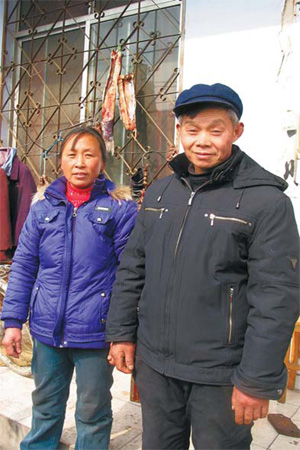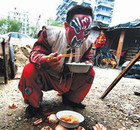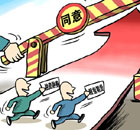Society
Festival joy for resettled couple
By Nie Ligao (China Daily)
Updated: 2010-02-18 09:40
 |
Large Medium Small |
Immigrant family faced sharp learning curve in starting new life
TAI'AN, Shandong: It has not been easy for He Gonghua and Deng Shiju since 2002 when they moved across the country because of the Three Gorges Dam project in their native Chongqing. Yet this year's Spring Festival has been one of their most special.
|
 Chongqing natives He Gonghua and Deng Shiju stand in the courtyard of their home in Tai'an, Shandong province, before Spring Festival on Feb 12. [China Daily]
|
"It's the first Spring Festival with my eldest son's new wife," said He. "My youngest son, a college senior, has also found an internship as an engineer."
The double celebration, coming at a time of year when family is most important in Chinese culture, is in stark contrast to their arrival in Yangliu, a small town near Tai'an, and the early struggles they experienced in adapting to their new home.
The family was one of six to move from southwest China to the country's prosperous east coast in August 2002. They were each allocated houses built by the local government and He's family received 2,700 sq m of farmland.
"It took us two days and one night to travel with all of our belongings thousand of miles to the settlement in Shandong," said He.
The immigrants found it hard to integrate. Locals spoke a different dialect, while the families had to plant unfamiliar crops like wheat, corn and peanut due to the different climate. "I cried day and night. I was homesick and worried about the future. We had no skills other than growing crops," said Deng.
Months later, the farmland allocated to He and two other families was expropriated for a school construction project and each received 1,000 yuan ($140) a year as compensation.
"We asked the local government for help and got nothing. A new official in the town cared little about us," said Deng. A spokesperson for the local government was unavailable for comment.
As well as land compensation, each immigrant also gets 600 yuan a year for 30 years from the output of the Three Gorges hydropower project, said He.
But with a sick father to care for and two sons to put through school, the subsidies were not enough to support his family at the time.
"We couldn't live on the compensation. The local government promised to find me a job, but it was nothing but lip service. I had to stand on my own two feet," he said.
Since 2003, He has worked as a migrant laborer, a tricycle taxi rider and a butcher.
It was also hard to start a business, especially for a couple in their 50s and in an unfamiliar place.
"Local people had no confidence in us because of our immigrant identity and dialect. Banks wouldn't provide loans to us because they feared we would run away with the money and never come back," he said.
Other immigrants have faced the same problem.
He's cousin, He Gongshu, a doctor, wanted to enlarge his clinic, but was unable to raise enough money.
"We meet all the conditions, but we can't get loans like local people," the doctor said.

Most migrants rely on friends and relatives for help, added He Gonghua.
The He family now runs a business selling pork products and its success has helped them to better integrate into the local community.
"I have no problem understanding the local dialect now and the pork business brings in more than 10,000 yuan a year," said He, whose wife added that their neighbors provided lots of help.
But He and Deng still miss their hometown in Chongqing. "Sometimes I dream I am still there," said Deng. Even though they talk with loved ones on the telephone, the couple rarely returns due to the long distance and travel costs.
"I couldn't even return for my father's funeral," said Deng as tears streamed down.
Both of He's children are back in their native southwest China. His eldest son has bought an apartment in Chongqing, while his youngest works in neighboring Yunnan province.
"We will move back and live with our eldest son when we get too old, but right now we need to keep working here in Shandong to make money for our children," said Deng.












